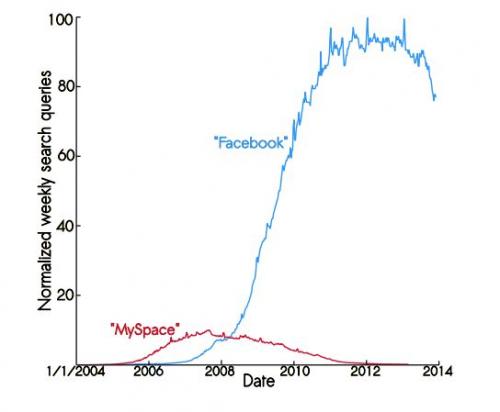There have been predictions of Facebooks demise for some time now. Whether it was a slump in their initial share price or more recent news that teenagers are apparently flocking elsewhere for their social fix, the predictions have kept on coming. By and large of course, those predictions have generally been proved wildly incorrect, with the social behemoth continuing to expand, both in terms of users and revenue.
A couple of Princeton researchers however believe that their mathematical model may do a better job at predicting the health of a social network than some of the aforementioned soothsayers. What’s more, they believe they’ve discovered that the fate of Facebook is not looking so good.
Based on the rise and fall of MySpace, John Cannarella and Joshua Spechler say that Facebook, the largest online social network in history, is set for a massive fall.
“Ideas, like diseases, have been shown to spread infectiously between people before eventually dying out, and have been successfully described with epidemiological models,” they wrote.
To arrive at their hypothesis, they applied a modified epidemiological model to map the user activity on various social networks. They used publicly available Google data for the research, and believe that it shows that Facebook is set for a substantial drop in usage.
“Facebook is expected to undergo rapid decline in the upcoming years, shrinking to 20 percent of its maximum size by December 2014,” said the report posted online to peers at ArXiv.org.
“Extrapolating the best ?t model into the future suggests that Facebook will undergo a rapid decline in the coming years, losing 80 percent of its peak user base between 2015 and 2017.”
It’s quite a claim. Suffice to say, the paper has yet to be peer reviewed so it seems unlikely that Mark Zuckerberg will be too concerned, and the likelihood of such a dramatic drop in usage seems unlikely.
The underlying principle of mapping human behaviour to that of a virus however is an interesting one. There have been numerous attempts to predict the spread of ideas and content in a viral manner, most of which have failed to do so consistently. It will be quite a coup if the two academics have managed to pull off a similar trick in this instance. We’ll just have to wait and see what December brings.

I doubt it very much. Some cool publicity for the kid doing the research though.
They're certainly on Facebook's radar if no one else.
Haha, reckon they'd be pretty darn rich if they had a model that would work.
Well yes, there is that. I'm skeptical, but time will tell.
Interesting reposte here from Facebook
https://www.facebook.com/notes/mike-develin/debun…
Interesting, thanks for sharing Andy.
I don't know about the model and its accuracy, but it should would be nice if Facebook would vanish. Not a positive thing for society at all.
Another study here from Carnegie Mellon. Seems slightly more accurate.
http://www.cmu.edu/news/stories/archives/2014/feb…